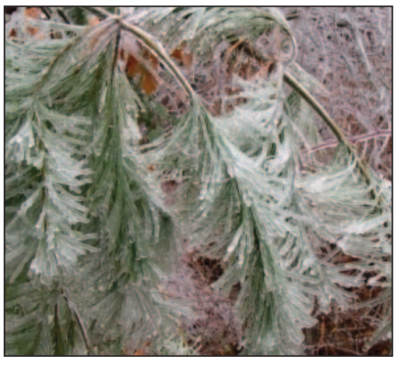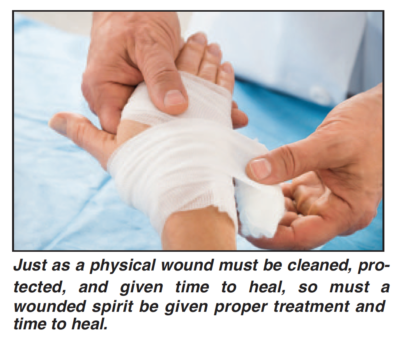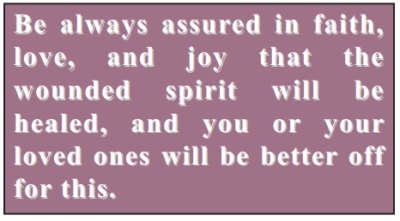
Healing a Broken Spirit
Lessons the Creation Teach Us About Affliction
How does one deal with a broken, depressed, humbled spirit? We all at times are afflicted with situations in life that leave us perplexed and wondering how we will ever escape the trauma. The Apostle Paul was well acquainted with such situations when he stated in II Corinthians 2:4, “For out of much affliction [thlipsis, ‘to crowd or pressure’] and anguish [synoche, ‘anxiety, perplexity’] of heart I wrote to you, with many tears, not that you should be grieved, but that you might know the love which I have so abundantly for you.” Day to day living brings us through emotional ups and downs — which are usual for everyone.
Yet, sometimes these daily problems can compound into major emotional crises that may threaten our stability, or cause us to waver on the bedrock hope that we have in our Savior and His promises. It is these critical crises of mind and spirit that are the subject of this paper. How should we as Christians deal with such crises within ourselves, or with others whom we discover are experiencing such trials? Our Messiah oftentimes dealt with severe trials, “A man of sorrows [makob, ‘anguish, affliction, feel pain, grieve’] and acquainted with grief [choliy, ‘calamity, be rubbed or worn, afflicted’]” (Isaiah 53:3), and we follow in His footsteps, suffering as He did (I Peter 2:21).
I have concluded that these times of trial and suffering are for very important purposes, indeed are essential for our spiritual growth, for unless we suffer as He did we cannot be glorified with Him at the resurrection … which suffering is not worthy to be compared with the glory that awaits us (Romans 8:17-18). This suffering and death is a daily experience (I Corinthians 15:31; Galatians 2:20), with the ultimate aim of imparting within us humility … without which we cannot please our Creator.
“But on this one will I look: on him who is poor and of a contrite spirit, and trembles at My word” (Isaiah 66:2).
poor = aniy, “depressed in mind or circumstances; abased.”
contrite = nakeh, “smitten, maimed, dejected.”
trembles = chared, “reverential, to shudder with fear.”

Moreover, such a broken state is extremely favored by our heavenly Father, as was revealed to David.
“For You do not desire sacrifice, or else I would give it; You do not delight in burnt offering. The sacrifices of God are a broken spirit, a broken and a contrite heart — these, O God, You will not despise” (Psalm 51:16-17).
broken = shabar, “to burst, literally or figuratively.”
contrite = dakah, “to collapse, physically or mentally.”
This message from David makes it sound like a literal physical or mental collapse is a good thing in God’s sight! Perhaps there is plenty of truth in that Scripture: our retreat from self-sufficiency to total sufficiency upon our Creator grants the humility that drives us to our Creator’s feet. That is why God has chosen the dross of humanity to be His people.
“For you see your calling, brethren, that not many wise, according to the flesh, not many mighty, not many noble are called. But God has chosen the foolish things of the world to put to shame the wise, and God has chosen the weak things of the world to put to shame the things that are mighty; and the base things of the world and the things which are despised God has chosen, and the things which are not, to bring to nothing the things that are, that no flesh should glory in His presence” (I Corinthians 1:26-29).
Lessons from Creation
We are told in Romans 1:20, “For since the creation of the world His invisible attributes are clearly seen, being understood by the things that are made ….” This profound statement leads one to consider that surely the major lessons in God’s word should therefore be seen within the created world. Please allow me to bring to you an experience with nature that I had while living in Texas some years ago.
A beautiful loblolly pine tree was growing wonderfully well on the slope below our house. It was nicely shaped, with a rapidly growing crown that exuded deep-green vitality to everyone who looked upon this superb example of God’s creation.
Then one winter a severe ice storm coated the tree with a heavy layer of ice upon the upper needles and branches, weighing its entire upper part down in a severe bend, nearly touching the ground. The temperature remained below freezing for several days, and finally rose above freezing and the ice melted … but the bend in the upper trunk of the tree rebounded only slightly. The wood had been permanently bent.
I intended to help the tree recover its vertical shape, so tied wires to the upper, bent trunk, and was careful to pad the wires around the wood so as not to damage the bark and cambium. The wires were staked down to coax the tree into a nearly upright position. I hoped this would cause the tree to quickly recover from its injury.
Several months later during the summer the top of the tree broke off! My well-meaning efforts to assist the injured tree had failed. However, to my amazement and relief the limbs just beneath the break began to turn upwards, and eventually two of them became leaders. It looked strange with two tops, but in every other way it looked healthy and robust.
There were other pine trees further down the slope that had also been bent by the ice storm. One in particular was bent as severely as had been the one I had straightened with wires. I held out little hope for its recovery, but as I watched the progress of healing, the trunk gradually straighten over the summer. By the following summer only a slight curve remained, and during the next few years the trunk totally straightened, leaving only a slight crook where the bend had been. That slight curve nearly disappeared entirely in time. The tree grew straight and healthy, thriving after recovering from the ice storm damage, and in spite of my lack of intervention.

I have often pondered this lesson of the pine trees and the ice storm. What is nature teaching us? What does a tree and its suffering teach us about our own afflictions?
Here is my answer. After an assault on the body, mind, or spirit do not try to prop up the injury from without — though certainly give reasonable care — but help the healing from within, assisting the inborn healing mechanisms to do their work as the Creator intended. Assist the natural healing powers of the body to recover lost or injured functions. Emulate our Messiah’s advice when He said,
“Come to Me, all you who labor and are heavy laden, and I will give you rest. Take My yoke upon you and learn from Me, for I am gentle and lowly in heart, and you will find rest for your souls, for My yoke is easy and My burden is light” (Matthew 11:28-30).
The recovery of a bruised body, mind, and spirit takes time and great patience, love, and kindness. Like the healing powers of a tree bent over by the weight of ice, so the human body, mind, and spirit will conspire to straighten that bend over time, and even erase the scar of the injury so it is visible only to oneself … nothing to be seen by those outside. A broken spirit, like a broken tree, is to God a sacrifice (Psalm 51:17). Under the weight of assaults from the world around us we are buffeted by trials and sufferings all of the time. Like Christ said to Peter, “Indeed, Satan has asked for you, that he may sift [siniazo, ‘to sieve or riddle’] you as wheat” (Luke 22:31), but in the next verse Christ assured Peter that He had prayed that Peter’s faith would not fail. So it is with us. The trials — the ice storms — are given to strengthen our resolve to pursue the ways of life, putting on the whole armor of God to be able to withstand the onslaught of the devil.
“For we do not wrestle against flesh and blood, but against principalities, against powers, against the rulers of the darkness of this age, against spiritual hosts of wickedness in the heavenly places” (Ephesians 6:12).

An assault on the body takes time to heal; the more serious the wound, generally the more time it takes. Some wounds of the soul may take a lifetime to heal. Yet, they are all designed for our perfection, to lead us to repentance and wrench us out of old, evil habits towards the fullness of the stature of Jesus Christ (Ephesians 4:13). He binds up our wounds.
“The Lord builds up Jerusalem: He gathers together the outcasts of Israel. He heals the broken in heart, and binds up their wounds” (Psalm 147:2-3).
“The righteous cry, and the Lord hears, and delivers them out of all their troubles. The Lord is near unto them that are of a broken heart, and saves such as he of a contrite spirit. Many are the afflictions of the righteous, but the Lord delivers him out of them all. He keeps all his bones; not one of them is broken” (Psalm 34:17-20).
“For thus says the high and lofty One, that inhabits eternity, whose name is Holy: ‘I dwell in the high and holy place, with him also that is of a contrite and humble spirit, to revive the spirit of the humble, and to revive the heart of the contrite ones’” (Isaiah 57:15).
Some of these wounds may be among the following, from the word poor [aniy] as used in Isaiah 66:2 and elsewhere.
- A disability or distress
- A financial squeeze, leaving one socially defenseless and subject to oppression by others
- Physical oppression
- Spiritual oppression related to physical oppression (Psalm 22:24)
- Simply being afflicted or poor, for whom God provides (Psalm 68:10)
- Being humble or lowly (Zechariah 9:9)
The wound must be treated carefully so as not to make it worse. I tried to help the pine tree straighten itself with anchor wires, but the force was too great and the wound broke. I should have left it alone, while simply mowing competing weeds, keeping it watered, and preventing my cattle from injuring it. We treat wounds of the body as follows.
- Keep the wound clean and free of contamination.
- Allow the wound to heal on its own, as cells divide and fill in the breaches, and stem cells migrate to the site and differentiate into the area’s own cell type. These processes should be aided by proper nutrition, exercise, sunshine, fresh air, and positive thinking, all of which will encourage cells and tissues to rejuvenate.
- Recognize that healing comes from within the body, and cannot be forced upon the wound; time is required for full recovery.
Nature teaches us there things regarding healing. The same applies to our own mind, soul, and spirit, or to those who are afflicted around us that we may try to help.

- Keep the wounded spirit “clean,” as it were, free of further assaults and abuses that may reopen the wound as it heals and make it worse.
- Give the wounded spirit time to heal at its own pace, for like a physical wound a wound of the mind or spirit will recover at its own pace. Encourage these natural processes by feeding the mind and spirit with the word of God and other positive truth, fellowshipping with brethren and friends who will provide encouragement to withstand the negativism of the adversary, and meditating and fasting for strength to overcome.
- Be always assured in faith, love, and joy that the wounded spirit will be healed, and you or your loved ones will be better off for this. Like a broken bone is mended, a cut on the skin is filled in, or a stroke victim’s brain recovers at least part of its use, so will a wounded soul be revived, ready to take on future assaults with renewed wisdom. In fact, the healed area is oftentimes stronger and more resilient than it was before.
A broken spirit is part and parcel with living in this modern age of sin. We from time to time find ourselves having to face trials and suffering that challenge us to the core. These trials are for our perfection, for building our faith, for casting out evil habits that need to be purged. It is likely that is the reason the Eternal allows us to experience them, just as Job endured horrific physical and mental trials in order that he might learn how great the Creator is: “I have heard of You by the hearing of the ear, but now my eyes see You. Therefore I abhor myself, and repent in dust and ashes” (Job 42:4-6). We can then move on towards perfection as Job did, who was given double the wealth after his trial as he had before.
When your spirit is broken and you fall into various trials, rejoice, “… knowing that the testing of your faith produces patience, but let patience have its perfect work, that you may be perfect and complete, lacking nothing” (James 1:2-4). Remember the lesson of the bent-over pine tree. Let time — let patience — have its day, as nature teaches us. Let us not break those bent-over trees, but encourage them to straighten and be healed in the Eternal’s ways and and in His time.
“Have you not known? Have you not heard, that the everlasting God, the Lord, the Creator of the ends of the earth, faints not, neither is weary? There is no searching of His understanding. He gives power to the faint, and to them that have no might He increases strength. Even the youths shall faint and be weary, and the young men shall utterly fall; but they that wait upon the Lord shall renew their strength: they shall mount up with wings as eagles, they shall run, and not be weary, and they shall walk, and not faint” (Isaiah 40:28-31).

